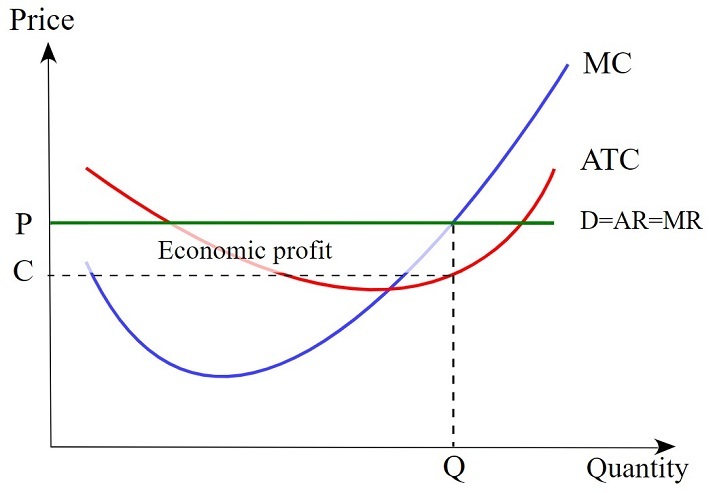
 Data Structure
Data Structure Networking
Networking RDBMS
RDBMS Operating System
Operating System Java
Java MS Excel
MS Excel iOS
iOS HTML
HTML CSS
CSS Android
Android Python
Python C Programming
C Programming C++
C++ C#
C# MongoDB
MongoDB MySQL
MySQL Javascript
Javascript PHP
PHP
- Selected Reading
- UPSC IAS Exams Notes
- Developer's Best Practices
- Questions and Answers
- Effective Resume Writing
- HR Interview Questions
- Computer Glossary
- Who is Who
Perfect Competition Defining Features
Introduction: What is Perfect Competition?
The term perfect competition is attached to a market condition where
All companies sell similar or the same products
There is no barrier for firms to enter the market.
Market share of companies does not influence the price
Buyers have complete, perfect, or full information
Companies cannot determine prices.
Simply said, perfect competition refers to a market where the prices are determined by mere demand and supply, and companies cannot determine the prices even if there is no entry barrier for new firms in the market. Perfect competition is more of a theory than reality because the features of a perfect market are hard to obtain. In the present world, almost all markets are imperfect.

Features of Perfect Competition
Presence of enough buyers and sellers in the market
In perfect competition, the markets usually have many buyers and sellers. There is no one firm that is present to monopolize the market condition. As there are many buyers and sellers, there is always unmet demand and equal supply in the market. This means that market forces are always present to define market conditions.
The presence of many buyers and sellers also conveys the message that buyers can engage in pursuing marketing and hence the market remains running always in full swing. Unlike an imperfect market where there are only a few sellers and too many buyers, the perfect market always has a balance of buyers and sellers. This also means that in a perfect market, there is always a balance between demand and supply.
As it is hard to find a perfect balance between demand and supply in real conditions, it is nearly impossible to find perfect competition in the modern world. Almost all economies in the world today are imperfect in nature.
The market has no barriers to entry and exit
In perfect competition, the market is free for all to enter and exit. That means that anyone who wishes to sell a product may become a seller any time they want. Usually in real markets, there is always a barrier and this helps established business organizations to get an advantage. However, this is not applicable to perfect competition.
Market conditions that have a barrier to entry to exit are a sign of an imperfect market. In the real world, most markets are imperfect which means that there are entries and exits in almost all markets. In particular, barriers to entry help current organizations that are already in business and want to keep this barrier intact. However, this is not the case when we consider perfect markets. This is a reason why it is hard to find a market that is perfect in all senses.
The same is applicable to exit in the case of perfect competition. An organization in a perfect market has no barriers which is untrue in the real world.
No transaction costs involved in the market
In a market that is perfect, there is no transaction cost involved in buying and selling products. This means that the price of the product does not include the transaction costs, such as taxes and levies applied by the government. Although such arrangements seem fancy, it is very hard to obtain. In most cases, the transaction of an item requires additional costs. In a perfect market, however, the costs involved with transactions are zero.
In modern economies, the transaction of an item is complex in nature. It requires various kinds of initiatives by the seller, such as stocking the items and procuring them when there is a need. Therefore, transaction costs are added to the price of a product while selling it. This goes against the concept of perfect market conditions.
This condition indirectly means that the availability of products is readily achievable and the products being sold are free from external charges. In the modern world, however, this is hard to see because most products are shipped to long-away markets which incur a considerable cost.
Buyers and sellers have complete knowledge of the product
Another impossible feat that is unavailable in real markets is complete information about products among buyers and sellers. This means that all buyers know the price and other information of a product they wish to buy from the perfectly competitive market.
Although this condition is applicable to all concepts of trading, such as ingredients of products, how they are produced, etc. the specific knowledge of the price of the product is predominant in such a case. Therefore, this condition refers to a state of market where sellers and buyers know the prices of products completely and so the sellers cannot charge extra from the buyers in terms of profit.
It can be estimated that in a perfectly competitive market, the prices of products will be less than what they would be in an imperfect market. The reason behind this is that buyers have complete knowledge about the product and their prices; so the seller cannot charge a higher profit when the demand for the product is high in the market.
Sellers in the market are offering identical products
In a perfectly competitive market, there is no variety of products. This means that all the items available in the market are identical in nature. It is easy to see why such a point of view is applied to perfect competition. If there are many items, there will be a division among buyers in terms of utility and this will impact the competitiveness of the market.
Selling identical products means that buyers have a limited supply for a limited demand in the market. If the demand and supply are not balanced, it will lead to imperfect competition. That is the reason why perfect competition does not allow too many different items in the market.
It is also apparent from the discussion that if there are many items in the market, it will be hard for buyers to have complete information about the products. So, the condition of having non-identical products is ruled out in the case of perfect competition.
Conclusion
Markets that are in a perfectly competitive stage are nearly impossible to find. This is so because having all conditions of perfect markets is nearly impossible to have in real markets. However, the concept of perfect competition is considered to throw some light on how the state of perfect markets should ideally be in the case of market economies around the world.
FAQs
Qns 1. Provide any four features of perfect competition?
Ans. Some features of perfect competition are
All companies sell similar or the same products
There is no barrier for firms to enter the market.
Market share of companies does not influence the price
Buyers have complete, perfect, or full information
Qns 2. Can companies determine the prices of products in perfect competition?
Ans. No. In perfect competition, the prices of products are determined by demand and supply forces.
Qns 3. Are there perfectly competitive markets in the world?
Ans. There are no perfectly competitive markets in the world at present. It is more of a theory than practice.

